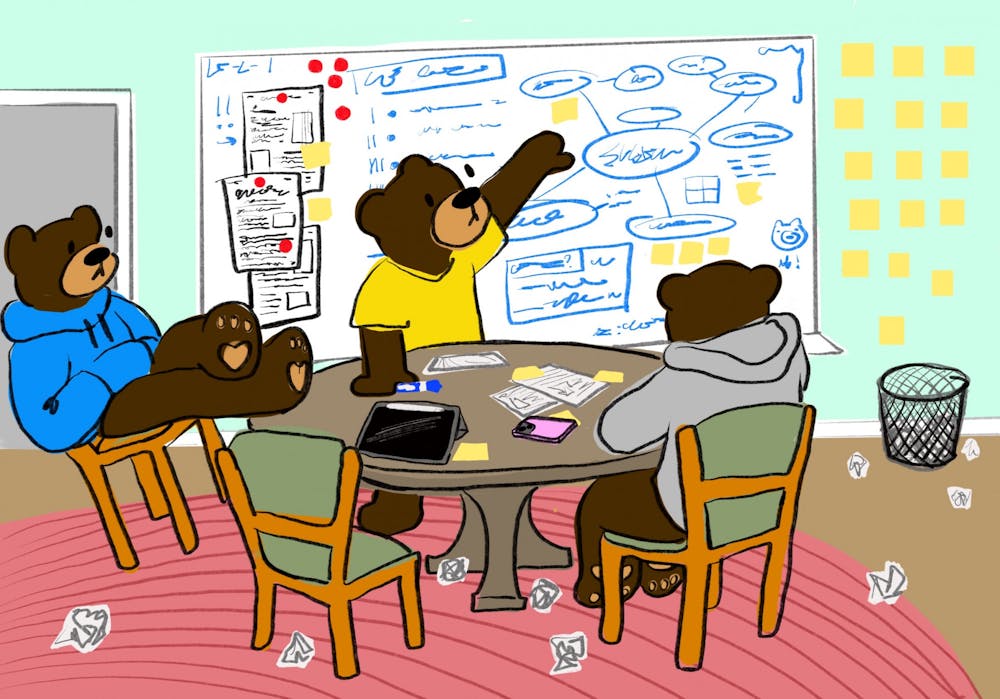Amidst the University’s creative scene, a small group of students found that there was one thing missing: an organization dedicated to TV writing and production.
Brown offers a variety of screenwriting groups and opportunities for students. Brown Motion Pictures produces student writing into short films, the Ivy Film Festival has its own screenwriting team and students can take coursework in the discipline. But students noticed that no club offered a forum to pursue writing and production specially tailored to episodic television.
Brown Original Series is a new club that seeks to occupy this formerly “unfilled need,” said Vincent Amato ’24, BOS managing director. “Telling stories in a serial fashion, or an episodic fashion, is a different art form.”
As opposed to letting writers work on their own independent projects, BOS plans to create a collaborative space, or a writers’ room, for its members. “This is more similar to what happens in the television industry — to have a collaborative group of people writing a piece together,” Amato said.
BOS solicited its first round of applications at the beginning of the semester and onboarded about 15 writers to create the club’s writers’ room, which is run by BOS Head of Writing Marielle Buxbaum ’24.
Buxbaum has experience organizing a writers’ room from during the pandemic. While most student activities were required to operate on Zoom, Buxbaum worked virtually with several other students to write a seven-episode murder mystery sitcom.
“I saw the power of the writers’ room as this collaborative opportunity, not only to create a project that none of us could have thought of on our own, but to create that kind of community centered around the new sense of humor and storytelling language we were building together,” Buxbaum said.
Currently, the BOS writers’ room meets twice a week, typically beginning with smaller group discussions and culminating with a meeting of the whole group, she explained.
“We hear what the different groups come up with, and then we synthesize and see what we like from that,” Buxbaum said. She added that this process makes it “really easy to kill your darlings and get rid of stuff that’s not working.”
Buxbaum also saw an advantage in the fact that not every writer is present at every meeting. “I have to convince a new room of people each time to uphold the ideas that the last meeting decided on, which means that they have to be really tight and I have to be really precise on what the ideas are,” she said. “When you’re writing with a group, you really have to … go back to that structural, theoretical element” of storytelling.
In addition to screenwriting, BOS plans to take on the production side of television in the spring, when the group will focus on translating a finished script to the screen. According to Amato, this will involve the assembly of a production crew around January, as well as conducting auditions and casting.
“It’s really nice for writers to have a chance to write something knowing that it’s going to be produced,” Buxbaum said. “I think there's a possibility where you can kind of free up your imagination to get crazy, do whatever you want … because you know it’s going to get made.”
Though there are other groups on campus that incorporate screenplays in their operations, BOS hopes its new niche will allow it to add to the broader University ecosystem and collaborate with its peers.
Josie Bleakley ’23, one of BMP’s managing directors, said that she is “excited by any new club that comes in to provide an outlet for people to explore those interests.” She also added that, given BMP’s attempts to maintain a policy of accepting “everyone who wants to join,” BOS may help relieve some pressure.
“The demand has gotten so big that it’s been hard to always find a good space for everyone to make sure they can really experience and contribute to each film,” Bleakley said.
Bleakley is also hoping that BMP can help BOS by passing down the “institutional knowledge” that the organization has gained over the years. “We definitely want to work with Brown Original Series to see how we can support them,” she said. “We have spoken a bit about seeing how we can share our equipment with them because we have the funding to do that at this time.”
There is also space for future collaboration between the two groups, as BOS has multiple writers who are on the BMP e-board, Buxbaum said. “There’s already a lot of cross-collaboration.”
Although BOS will not be tackling the production side of television until the spring semester, Amato is already planning for the club’s next stage. “I would like to work on a proprietary streaming platform that you can stream the episodes on,” he explained, suggesting a staggered release of the finished series.
But first and foremost, the goal remains to have a complete, four-to-five episode product. “I’m hoping,” he said, that “we can have a finished limited series done toward the end of next semester that we can show.”

Rya is an Arts & Culture editor from Albany, NY. She is a senior studying English and Literary Arts, and her favorite TV show is Breaking Bad.





